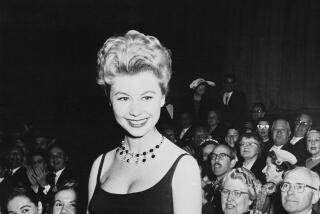‘Anything Goes’ just wants to have fun
With roles in major theatrical productions of “Kiss Me, Kate” and “City of Angels,” Rachel York is no stranger to elaborate musical numbers.
But the veteran actress was brought up short by the eight-minute tap dance that choreographer Kathleen Marshall put together for the title number of “Anything Goes.”
“I thought to myself, ‘My body is either going to fall apart or it’s going to get in shape very, very quickly,’” said York, the mother of a 22-month-old daughter.
As the sweet but seductive lounge singer Reno Sweeney, York, 41, anchors the touring production of the Cole Porter revival. The champagne sip of a show opens at the Ahmanson on Nov. 27 for a six-week run after a Tony Award-winning stay on Broadway that began in 2011.
FALL ARTS PREVIEW: Critic’s Picks
The New York cast has been wholly replaced — York plays the role that Sutton Foster won a Tony Award for last year — but most of the backstage principals stayed on for the touring version, including not-for-profit producers Roundabout Theatre Company as well as Marshall, who knows just what she’s putting her performers through.
“If Rachel was just dancing for eight minutes, that would be hard enough,” the director-choreographer said. “But she has to sing at the end of it all too.”
Originating on Broadway in 1934 and retooled significantly off-Broadway in 1962, “Anything Goes” takes place aboard an ocean liner, where stowaway Billy Crocker (Erich Bergen in the Ahmanson production) attempts to court an heiress above his station with the help of Sweeney and the gangster Moonface Martin.
The 2011 revival was an anomaly for contemporary Broadway, where musicals tend to come either in subversive flavors like “The Book of Mormon” or as jukebox singalongs such as “Rock of Ages.” Even revivals of classics like “Porgy and Bess” often get more modern treatments.
By contrast, “Anything Goes” is a kick-up-your-heels jam meant to do now what it has done throughout its life: “To lift you up as you walk out of the theater,” in the words of Roundabout artistic director Todd Haimes.
In the run-up to its 2011 opening, the revival inspired some tittering from Broadway observers. Appearing in an economic climate not dissimilar to the Depression-era original, many saw a new version as unnecessary.
But soon after its opening the show began to build strong word-of-mouth, in part based on Marshall’s choreography and Foster.
PHOTOS: Arts and culture by The Times
York says she didn’t speak to Foster about the part in the touring company, which has previously made stops in Cleveland and Tempe, Ariz. But she believes she’s carving out her own space for the character.
“Mitzi Gaynor played the role [in the 1956 film] as a little more Vegas showgirl, and I think Sutton’s performance had more of a tomboy aspect to it,” York said. “My take goes back to the old movies, a kind of Barbara Stanwyck-Mae West sort of thing.”
The books for a 1987 Lincoln Center production (with Patti LuPone as Reno) and the 2011 Broadway show were written by John Weidman and Timothy Crouse, the latter the son of Russel Crouse, who wrote the original book. Several scenes and numbers were cut from the show before it opened on Broadway in 1934, angering the elder Crouse so much that he stood outside a tryout theater in Boston begging patrons not to go in. Crouse was involved in the 1962 revival — for which he restored the cut material.
For the modern versions, the pair wanted to retain much of the spirit of the earlier productions, but they also knew that not all of it translated decades later, either.
“The pace was on the leisurely side, and stakes were not very high,” Crouse said. “Even when the show is goofy and silly you need to believe that if Billy Crocker doesn’t marry this girl his life is going to be over.”
Musically, the current version includes numbers that haven’t made it into every production of the show, including “Blow, Gabriel, Blow,” “I Get a Kick Out of You,” “It’s De-Lovely” and, of course, the first-act closer “Anything Goes.”
Many Porter lyrics left out of earlier versions were also restored, and the dance steps have become more intricate.
“Sometimes we’d just want to make sure we had all the elements — Reno and the sailors, Reno and the angels — and it wasn’t until we put it all together that we realized we had a monster number,” Marshall recalled with a laugh.
That doesn’t mean, of course, that the show has become more serious than it was nearly 80 years ago. But it can still execute a precise vision.
“It’s silly,” Haimes said, “but it’s silly in a way that everybody is so committed to it that everything works.”
MORE
CRITIC’S PICKS: Fall Arts Preview
TIMELINE: John Cage’s Los Angeles
PHOTOS: Arts and culture in pictures
More to Read
The biggest entertainment stories
Get our big stories about Hollywood, film, television, music, arts, culture and more right in your inbox as soon as they publish.
You may occasionally receive promotional content from the Los Angeles Times.











